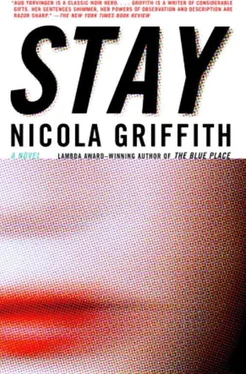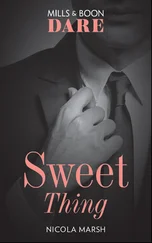It seemed that Tammy could climb a ladder up to the roof and the chimney, but not let go of it once she was there, which made the whole exercise rather pointless. I would have to wait a few days before I could get up a ladder and do the chimney repairs myself. Meanwhile, I took a look at the flue and inside stonework. Apart from a few minor repairs, the flue looked solid and well designed, and we didn’t need ladders for the first stage of interior pointwork.
Under my direction, Tammy carried the bags of cement and buckets of water and mixed the two in the right proportions until I was satisfied. Then I showed her how to slap the mortar between the stone with an upward stroke, slice the excess off with the downstroke, and shape what was left with a fast right-to-left horizontal swipe.
“The trick is to not get mortar all over the face of the stone because then you have to chip it off bit by bit when it’s dry, which is tedious and time-consuming.”
Slap, chop, scrape. Slap, chop, scrape. Stretch, bend, sigh. Mindless rhythm of stone and mortar and steel, dusty scent of mortar and wet mixing board. It was probably not much over fifty degrees outside, and a breeze blew through the open door, but Tammy’s face grew lightly sheened with sweat, and my knee ached.
I woke in the early hours. I took the phone outside and called Eddie’s number at the Journal-Constitution . I had to leave a message.
“It’s me. I need follow-up on that George Karp story, whatever comes over the wires: new leads, witness statements, police activity, Karp’s condition. I’m particularly interested in what evidence the police think they have. You’ve got my number.”
The first two days, we worked only until lunch because I was still too tired to do a full day. When my knee got strong enough to lighten the strapping, and limber enough to climb cautiously up the ladder to repoint the chimney, I spent an hour every afternoon in the woods. There wouldn’t be many of these days left, and it gave me time to think about Karp and what might happen if he woke up and gave the police a good description; what might happen if the police took that description to the local cafés, talked to the waitress in the second café, where I’d left the book. I tried to think about moving money to a Swiss account and how I could build a new identity, but each time found myself wondering instead how I could make sure nothing went wrong in Arkansas, or contemplating what still had to be done at the cabin.
Tammy and I didn’t speak much during the day, but at night, over food and coffee, we talked of this and that. I told her about Dree, the hairdresser, about Asheville, what I could remember of the history of the place. She told me of her undergraduate years at the University of Georgia, the friends she had lost touch with. We didn’t drink. We didn’t read. We would climb into our respective beds and sleep like stones, or at least Tammy did. I woke up suddenly, at all hours, thinking of Karp—I should have killed him, should have made sure; I shouldn’t have hurt him in the first place—wondering what was wrong with me, why I wasn’t already running, and where a nine-year-old girl might go to hide, if she could.
One morning I woke before dawn. The air was still and cool and humid, the way it gets in an airtight metal box, no matter how nicely you disguise the interior with leather upholstery and good carpets, and I wanted to walk. I dressed quietly and crept out into the clearing. My breath bloomed before me like the thought balloon of an empty-headed cartoon character. There were no tracks in the hoarfrost. The predawn sky was like lead, with barely enough light to see. I was glad of my thick jacket.
Amid the trees, leaves fell, gray and silent, like something filmed in the early days of cinema. The air was crisp enough to slice at the warm mucus membranes of my nose and throat, and smelled of iron. Autumn. This is where new life begins, with the seed falling on hard ground, being buried by dead leaves. The old life had to die first.
Tammy was dressed and on what looked like her third cup of coffee by the time I got back. The bright interior of the trailer seemed garish after the cold clarity of the woods.
“I was trying not to get worried,” she said.
“I woke up this morning and it occurred to me that I hadn’t seen or heard a groundhog in days, that they’ve begun to hibernate, and I went out into the woods and saw the first gouged tree of the season—from deer, rubbing the velvet off their new antlers—and I realized it’s November.”
“Okay. Let’s pretend I don’t understand what you’re talking about and need a few hints.”
“Today is the second of November. My birthday.”
“Your birth—”
“And I was thinking, there are a few things we need, and I should return that Neon.”
“Wait. Back up. How old are you?”
“Thirty-two. And you were saying only yesterday that your hair needs cutting. We could go into Asheville. Maybe have something to eat, something to drink.”
She blinked. Maybe it was her first cup of coffee after all. Then she smiled. “When do you want to leave, birthday girl?”
We dropped the Neon off first, then I drove the truck to the salon, where there were already two people waiting; I stayed long enough to say hello to Dree and tell Tammy that if I wasn’t back by the time she was done I’d meet her in the café next door.
On Church Street, I hesitated, engine running, outside the Asheville Savings Bank, while I thought, I can’t, I’m not ready, but had no idea what I meant. Eventually I parked.
The manager’s office, white shelves holding books and plants surrounding her door, light wood desk, medium window, was as relaxed as she was. At my suggestion, she called Lawrence, my banker in Atlanta, and decided as a result that she would be very happy to attend to my every need as far as local business dealings were concerned. She came round to my side of the desk, shook hands, and prepared to escort me back into the public space and the care of a trusted teller.
By the door, I noticed the bonsai tree. A perfect oak, ancient and stately, and only six inches high.
“Eighty years old,” she said. “It was an anniversary present from my husband. Beautiful, isn’t it? It came with a book—”
When I had tried to talk to her about setting up a Swiss account, my mouth had dried up, and I imagined a nine-year-old in a foreign country, with no love, no one to rely on. I don’t care, I told myself, I’ve never even met her—and what use would I be to her in jail? But I still hadn’t opened my mouth.
“—torture it: prune the roots, clip out new limb growth, and wire the branches to achieve the desired shape. Sometimes I wonder what would happen if I just let it grow.”
The manager shook herself from contemplation of the tree and asked if, apart from facilitating an immediate account, there was anything else she could do to help.
She gave me directions to Architectural Glass, two different hardware stores, and a place called Bathed in Light.
Bathed in Light had exactly what I needed. I arranged to go back later that afternoon to pick up the bathtub, sinks, and other fixtures I had picked out. Thoughts of Karp and fingerprints got muddled up with stainless steel faucets and brass-accented showerheads.
Architectural Glass was harder to find and there was nowhere nearby to park—unusual in Asheville. The woman who tried to answer my questions was one of those transplants from the Northeast who believe they are far, far better than anyone who has ever lived in any of the southern states. She smiled patronizingly while I explained what I wanted, then explained to me why that wouldn’t be possible. I asked to see the manager. She told me she hardly thought that would be necessary. I told her she was right, she hardly thought, which was why I wanted to see the manager. Now. It turned out I couldn’t have the glass until the day after tomorrow.
Читать дальше












